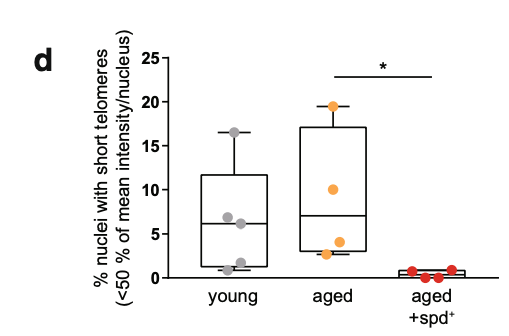I have not seen the published ITP/mice/Spermidine study, so impossible to comment rigorously.
Not going to fill pages, but here’s some bonafide papers:
Autophagy in T cells from aged donors is maintained by spermidine and correlates
with function and vaccine responses
"We have recently shown that treating old but not young mice with the metabolite spermidine
improves autophagy levels in B lymphocytes due to an age-related decline of endogenous spermidine. We find that spermidine levels decline in PBMCs in the older humans. We determined spermidine levels in PBMCs by gas chromatography-mass spectrometry (GC-MS), and found an inverse correlation between age and spermidine but not with spermine or putrescine (Figure 3a). This confirms earlier study in plasma in which spermidine levels were found to be low in the >65 age group and rising again in centenarians. With this study we show for the first time that the autophagy-inducing drug spermidine has an immune boosting effect on the T cell compartment in humans in vitro and that low autophagy levels correlate with low responses to vaccination. Therefore, spermidine and an mTOR inhibitor may have to be combined to optimally restore immune responses in the older adults.
Spermidine and Spermine Are Enriched in Whole Blood of Nona/Centenarians
https://doi.org/10.1089/rej.2012.1349
Recently, it has been demonstrated that exogenously administered spermidine promotes longevity in yeasts, flies, worms, and human cultured immune cells.
“Here, using a cross-sectional observational study, we determined whole-blood polyamines levels from 78 sex-matched unrelated individuals divided into three age groups: Group 1 (31–56 years, n = 26, mean age 44.6– 6.07), group 2 (60–80 years, n = 26, mean age 68.7– 6.07), and group 3 (90–106 years, n = 26, mean age 96.5– 4.59). The total content of polyamines is significantly lower in groups 2 and 3 compared to group 1 ( p = 3.6 · 10 - 12).”
Cardioprotection and lifespan extension by the natural polyamine spermidine
“Here we show that oral supplementation of the natural polyamine spermidine extends the lifespan of mice and exerts cardioprotective effects, reducing cardiac hypertrophy and preserving diastolic function in old mice. Spermidine feeding enhanced cardiac autophagy, mitophagy and mitochondrial respiration, and it also improved the mechano-elastical properties of cardiomyocytes in vivo, coinciding with increased titin phosphorylation and suppressed subclinical inflammation”
Novel aspects of age-protection by spermidine supplementation are associated with preserved telomere length
“Here, we show that a 6-month administration of the natural autophagy inducer spermidine in thedrinking water to aged mice is sufficient to significantly attenuate distinct age-associated phenotypes. These include modulation of brain glucose metabolism, suppression of distinct cardiac inflammation parameters decreased number of pathological sights in kidney and
liver and decrease of age-induced hair loss. Interestingly, spermidine-mediated age protection was associated with decreased telomere attrition, arguing in favour of a novel cellular mechanism behind the anti-ageing effects of spermidine administration”

Spermidine protects from age-related synaptic alterations at hippocampal mossy fiber-CA3 synapses
“Our data demonstrate that dietary spermidine attenuates ageassociated deterioration of MF-CA3 synaptic transmission and plasticity. These fndings provide a physiological and molecular basis for the future therapeutic usage of spermidine.”